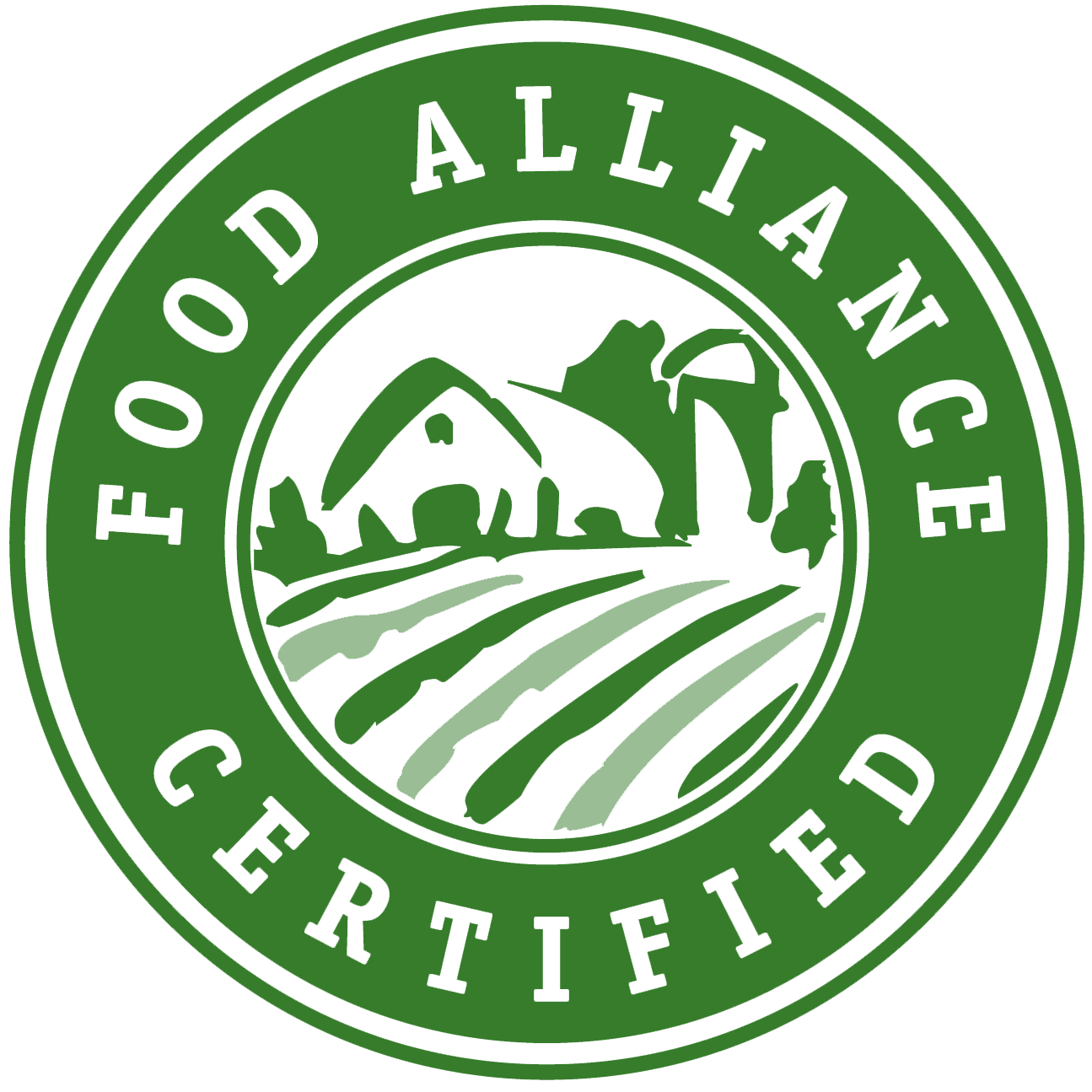
Food Alliance is the most experienced sustainable agriculture certifier in the United States
Value of Certification
Setting the Standard for Sustainable Agriculture Since 1997
Food Alliance certification is a voluntary means for agricultural producers and food companies to address growing customer demand for traceability, transparency, and social and environmental responsibility.
Food Alliance is the most experienced sustainable agriculture certifier in the United States – with over two decades spent developing and maintaining comprehensive sustainability standards and criteria for a wide range of agricultural products, including: fruits, vegetables, grains, livestock, eggs, dairy, shellfish, mushrooms, grains, legumes, horticultural products, and prepared food products made with Food Alliance certified ingredients.
Food Alliance is a non-profit organization. We are motivated by our mission. That means that Food Alliance certification, with clear, publicly available standards and a rigorous third-party audit process, is a credible and effective way for producers and food companies to demonstrate their commitment to sustainable management practices.
Food Alliance Offers Six Certification Programs
This covers all fruit, vegetable, nut, cereal, pulse, mushroom, and other crops.
This covers beef cattle and bison, sheep and goats, pigs, poultry and eggs, and dairy products. An optional “grassfed” certification is also available for ruminants.
This covers North American production systems that produce shellfish from seed to harvest within a defined area and with clear ownership of the shellfish being cultured. It applies to shellfish farms that produce oysters, clams, mussels, geoducks and does not cover wild harvest.
This covers field, container, and greenhouse operations in North America producing one or more of the following products woody ornamentals, annuals, perennials, foliage plants, potted flowering plants, cut flowers and the standard does not currently apply to Christmas trees, tree farms, etc.
This covers packing, processing, and distribution facilities.
This covers producers of beer, wine, cider, and distilled products. Separate certifications for suppliers of main ingredients by weight (malt, grapes, apples, pears, etc) and for the operation.
Guiding Principles
These eight principles inform Food Alliance’s definition of sustainability and our certification programs
Support safe and fair working conditions
Farm and food industry workers have secure and rewarding jobs that provide a sound livelihood. Employers respect workers’ rights, are committed to their well-being, make safety a priority, maintain a professional workplace, and provide opportunities for training and advancement.
Ensure healthy, humane animal treatment with no growth hormones or non-therapeutic antibiotics
Animals are treated with care and respect. Living conditions provide access to natural light, fresh air, fresh water, and a healthy diet, shelter from extremes of temperature, and adequate space to engage in natural behaviors and have social contact with other animals. Managers minimize animal fear and stress during handling, transportation and slaughter.
Protect, enhance, and conserve soil resources, water resources, and biodiversity
Farm and ranch managers improve soil health, protect water quality and supply, and support healthy native plant and animal communities.
Reduce risks associated with pesticides and other toxic or hazardous materials
Managers avoid use of chemicals that have adverse impacts on human and ecosystem health, and take steps to ameliorate known risks, implementing a bio-intensive system of Integrated Pest Management. Materials used for pest control, sanitation, waste treatment, and infrastructural maintenance are chosen to reduce overall negative consequences.
Conserve energy, reduce and recycle waste
Waste streams from food production are minimized while reuse, recycling, and composting of resources is maximized. Businesses invest in innovation and improvement to ensure efficient use and management of natural resources for energy and packaging, transport, and daily operations.
Guarantee product integrity, no genetically engineered or artificial ingredients
Foods are not produced using synthetic preservatives, artificial colors and flavors, genetically modified organisms (GMOs), or products derived from livestock treated with sub-therapeutic antibiotics or growth-promoting hormones.
Maintain transparency and the “chain of custody”
Throughout the entire supply chain, food is produced and handled in accordance with these Principle Values. Transparency is maintained through application of clear standards, verification through third-party audits, and clear labeling and record-keeping.
Continually improve practices
Food businesses are committed to continually improving management practices. Improvement goals are integrated into company culture, regularly monitored, and acknowledged when achieved. Food buyers are proactively engaged in the food system, and support companies that are transparent about their improvement goals and progress.











